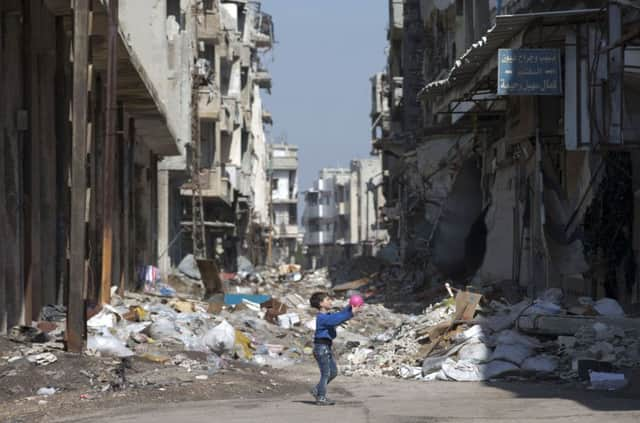Ceasefire brings some calm to Syria but IS attacks continue


The war against the Islamic State group continued as the extremists attacked a northern border town. Syrian state television also reported that several shells had hit residential areas of the capital, Damascus.
IS – which is not party to the ceasefire – launched several attacks after the truce went into effect, including on the northern town of Tal Abyad, on the border with Turkey, and at least one suicide bombing in central Syria.
Advertisement
Hide AdAdvertisement
Hide AdThe ceasefire went into effect across Syria at midnight, marking the most ambitious international attempt yet to reduce violence in the devastating conflict, which has seen more than 250,000 people killed, about one million wounded and created Europe’s worst refugee crisis since the Second World War.
The Syrian government and 97 rebel and militant groups said they will abide by the ceasefire.
The truce also excludes al-Qaeda’s branch in Syria, known as the Nusra Front.
Syria’s state-run news agency said that “terrorist groups” entrenched in Jobar and Douma, two opposition-held Damascus suburbs, fired on residential areas.
Rebel groups also said they have registered numerous violations by government forces across the country that could threaten the agreement.
Lieutenant Colonel Fares al-Bayoush, commander of the 1,300-strong Fursan al-Haq Brigade, a US-backed rebel faction, said that his group and others affiliated with the mainstream Free Syrian Army are so far abiding by the truce.
“If they continue with these violations we will be forced to retaliate accordingly,” he said. He added, however, that the ceasefire has sharply reduced government attacks across northern Syria, where his group is based.
A co-ordination centre at the Hemeimeem air base in Syria’s coastal province of Latakia, where Russian warplanes are based, has 61 officers who negotiate with groups willing to join the ceasefire and co-ordinate aid deliveries.
Advertisement
Hide AdAdvertisement
Hide AdAccording to Syrian state media, IS launched two suicide attacks near the central town of Salamiyeh, one on an army checkpoint that killed two and wounded four. The second car bomb was destroyed by Syrian troops before reaching a military post, state TV said.
The IS-affiliated Aamaq news agency said the group claimed responsibility for the blasts in the area, where most residents belong to the Ismaili branch of Shiite Islam. The Sunni extremist IS views Shiites as heretics.
In the north, IS fighters attacked the border town of Tal Abyad and the nearby village of Suluk, which were captured several months ago by Kurdish fighters, according to a Syrian rebel official.
Battles have continued for five days in the strategic area near the road that links Aleppo with central and western Syria. State TV said Syrian warplanes attacked oil tanker trucks belonging to IS in the eastern province of Deir el-Zour.
However, in southern Syria, the situation was “calm” yesterday, according to opposition activist Ahmad al-Masalmeh, who is based in the southern city of Daraa.
Calm also prevailed in large parts of the central province of Homs, according to Mohammed al-Sibai, who is based in the province.
He said: “The situation yesterday was very bad and fighting was intense. Then it was like a football match. People were excited and once the referee blew his whistle all the noise stopped.”
Meanwhile, Germany has declared Syrian and Iraqi passports issued in territory controlled by IS to be invalid.
Advertisement
Hide AdAdvertisement
Hide AdThe measure was taken less than a month after French police found Syrian passports on the bodies of two men involved in the 13 November terrorist attacks in Paris.
Security services believe IS seized large numbers of blank passports and related equipment when they captured Deir el-Zour, Raqqa and al-Hasaka in Syria, and Mosul and Anbar province in Iraq.